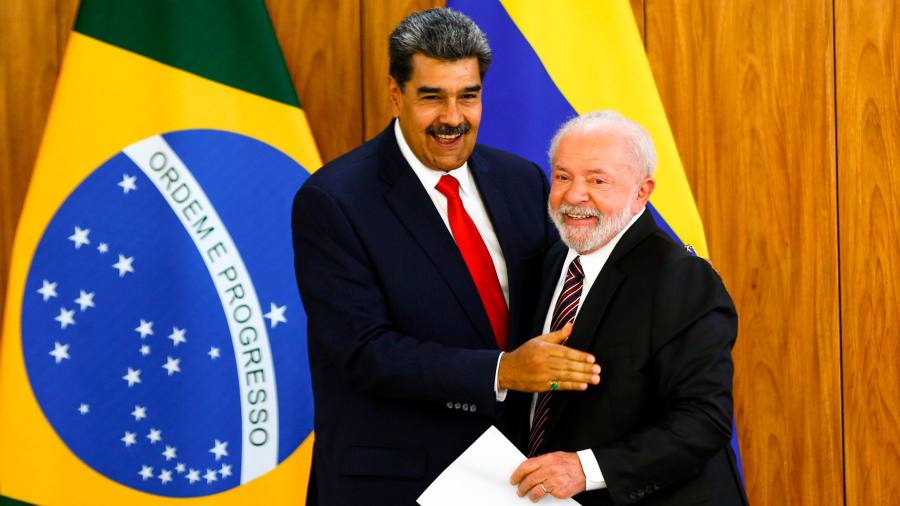Hopes are fading of a return to democracy in Venezuela as authoritarian President Nicolás Maduro wins greater regional recognition, frustrating US and EU efforts to press him into negotiating free and fair elections for next year.
After years of isolation following his disputed 2018 election victory, an increasingly triumphant Maduro basked in the diplomatic limelight at a South American summit last week hosted by Brazil’s leftwing president, Luiz Inácio Lula da Silva.
Maduro told his fellow presidents his country had survived an assault by the US under former president Donald Trump that was “more brutal than [Russia’s] attack on Ukraine”. He cited “900 sanctions and measures against the whole economy” alongside assassination attempts, threats of military invasion and international isolation.
“And here we are, resisting and looking forward to the future,” he concluded, after boasting that his revolutionary socialist party had won 27 out of 29 presidential, parliamentary and local elections during its 24 unbroken years of rule.
Standing next to Maduro, Lula offered him an uncritical endorsement and spoke of “a narrative which has been constructed against Venezuela”, adding: “I think Venezuela ought to show its own narrative so it can really change people’s minds.”
Thomas Shannon, a former top US state department diplomat who is now an adviser at Washington law firm Arnold & Porter, said Lula had “really undermined the approach that the Biden administration has — which could have had some success — by convincing Maduro that he doesn’t have to give the opposition anything”.
Maduro is facing an investigation by the International Criminal Court for possible crimes against humanity and has a $15mn US bounty on his head over narcoterrorism charges. However, he also secured bilateral meetings in Brasília with Argentina and Colombia’s leftwing leaders, as well as Lula.
None of them publicly criticised the political repression and economic mismanagement in Venezuela that triggered the exodus of 7mn refugees. Only Chile’s leftwing leader and Uruguay’s conservative president raised concerns about rights abuses in Venezuela, remarks Maduro quickly batted away.
A Brazilian diplomat said Lula had privately raised the issue of Venezuelan elections with Maduro. “The important thing was to get these presidents together,” he said. “For years we had a situation with some refusing to be in the same room as others.”
The Biden administration shifted away last year from a failed Trump-era strategy of “maximum pressure” sanctions intended to force regime change in Caracas. In November it allowed Chevron to restart limited oil exports from the country, a move intended to induce Maduro to reopen talks with the opposition.
The US concession followed a preliminary agreement between the Maduro government and the opposition at Norway-brokered talks that $3bn of frozen Venezuelan funds held in the west should be spent on humanitarian projects.
But six months later, the funds have yet to be unblocked, the talks have not resumed and time is running out for negotiations that could improve the chances of a free presidential election being held next year.
No date has been set for the vote, but with the opposition in disarray Maduro has hinted he might bring the ballot forward.
“Maduro feels no pressure to sit with the opposition and negotiate terms for the election,” said Ryan Berg, director of the Americas programme at the CSIS think-tank in Washington. “Even less so, now that the region is coalescing around him.”
Maduro survived the years of western ostracism by turning to China, Russia, Turkey and Iran and dodging sanctions by sending cargos of oil to east Asia through intermediaries. US officials say his government augmented state coffers by encouraging illegal gold mining in the Amazon rainforest and taking a cut from drug traffickers.
Venezuela has taken a free market turn in recent years, allowing increased use of the US dollar and dismantling some state controls. The IMF said Venezuela’s gross domestic product grew 8 per cent last year and will grow another 5 per cent this year, albeit from a very low base.
The EU had hoped to exploit Maduro’s desire for greater legitimacy by dangling the prospect of an EU observation mission for next year’s election. But diplomats in Brussels admit that they will not be able to proceed if Caracas fails to make even minimal political concessions.
“The window of opportunity may close soon,” one senior EU diplomat said. “It’s a question of months.”
The difficulty for the US and EU is that, after the failure of the Trump-era sanctions and western attempts to recognise an alternative government led by former Congress president Juan Guaidó, they have few options left.
“Engagement with Maduro is important as he has no intention of going anywhere,” said Tamara Taraciuk Broner, a Venezuela expert at the Inter-American Dialogue in Washington. “But that engagement can’t be free, it needs to generate incentives for the Venezuelan authorities to advance in a democratic process.”
“The last thing the Venezuelan people need is to have Maduro’s profile raised,” she added. “Maduro has his own narrative about what is happening and Lula . . . gave that narrative more resonance.”
Additional reporting by Michael Pooler in São Paulo
Read the full article here




